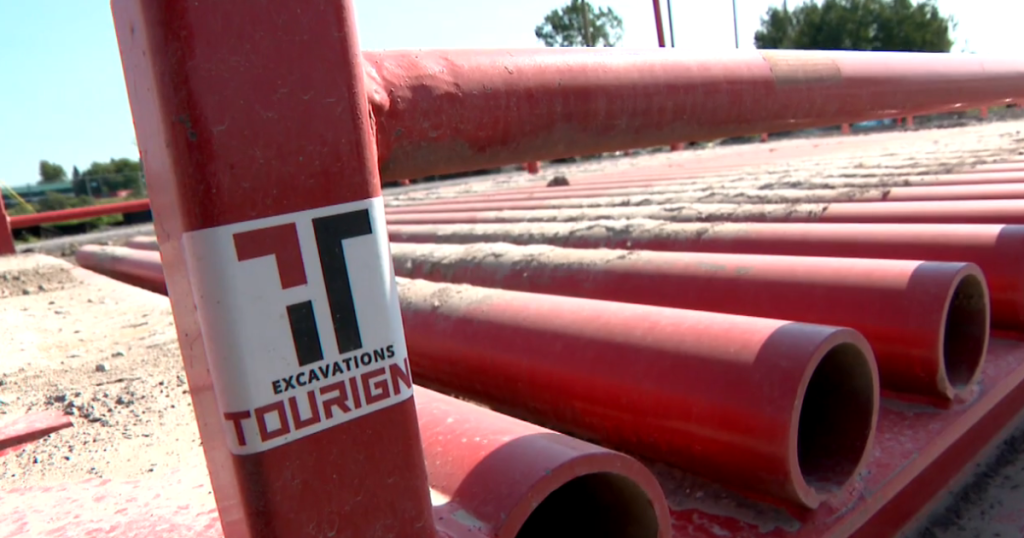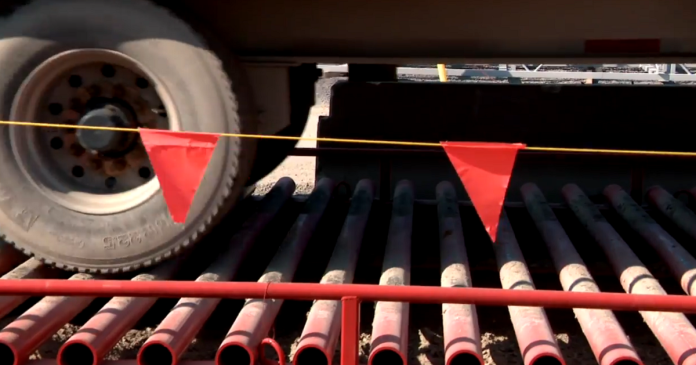Truckers working on battery-related projects along Autoroute 30 in Quebec have been facing a rise in incidents caused by granular materials, such as gravel, falling from their trucks.
Last October, the medias reported, “The number of motorists affected by granular materials being projected from moving trucks or from the road is countless,” describing it as an epidemic of shattered windshields.
Despite the use of tarps and covers to secure loads, accidents still occur, especially with loose materials like stones. To tackle this issue and reduce frustration among other road users, companies like Nemaska Lithium and Ultium Cam have implemented cleaning stations at the exits of their sites.
These stations allow truckers to drive over metal rollers that shake the trucks, dislodging stones and dust from the tires. This solution, designed by Air Liquide and developed by Excavations Tourigny, aims to reduce debris left on the road while minimizing environmental impact. Alain Tourigny, president of Excavations Tourigny, explains that this system lessens the need for mechanical road sweeping, thus reducing the environmental footprint.

Additionally, Nemaska Lithium has introduced a manual sweeping system where a worker cleans trucks at site exits and ensures that protective tarps are properly secured. Vincent Perron, Director of Environmental Affairs at Nemaska Lithium, notes that these measures help truckers prevent hazardous material from being projected onto the road, thereby improving safety for all.
The Becancour Industrial and Port Park Corporation, which faced this issue due to increased traffic from the construction of a large battery factory, welcomes the benefits of these measures. Donald Olivier, CEO of SPIPB, highlights that these installations have contributed to safer roads and represent a model for other regional companies, particularly in managing debris and transportation risks.
With these initiatives in place, there is hope that motorist frustration over debris from trucks will decrease, fostering better coexistence between truckers and road users.
Read more about trucking :
- Trucking: ELDs Boost Efficiency, but Major Challenges Persist : ELDs have not reduced accidents as expected, and their effectiveness in improving road safety remains contested within the trucking industry. “For companies that were already compliant under paper logs, the ELD provided additional tools to ensure compliance, as they now have real-time information. But those who were gaming the system before continue to circumvent it because companies are given access to ‘correct’ the hours, which leaves the door open for falsification, and we witness this daily,” explains Jean-Claude Daignault, President of the Fraternity of the Road Transportation Officers of Quebec (…)
- Truck Parking: A Critical Issue for Road Transport Safety : Major highways often lack safe parking spaces, forcing drivers to park in unsafe areas or continue driving while fatigued. While investments in road infrastructure are crucial, the need for truck parking is urgent. Governments are focusing on the electrification of transport, but driver safety must be a top priority, starting with ensuring that truckers can access parking whenever needed. The truck parking issue is a growing concern, particularly in high-traffic areas such as British Columbia and Ontario. Truck drivers, especially around the Lower Mainland in B.C., struggle to find adequate overnight parking. There is only one significant facility on Highway 91 near Nordel Way, with plans for additional spaces in North Surrey, but this will provide minimal relief considering the demand. The region has over 20,000 heavy vehicles, and drivers are often forced to park in unsafe or unauthorized locations, which creates safety and logistical problems for both the industry and local communities. Similarly, Ontario faces significant challenges in cities like Brampton and Caledon, where illegal truck parking has become rampant. With Peel Region serving as a central hub for Canada’s supply chain, the shortage of truck parking spots puts immense pressure on both truckers and local governments. Various levels of government are now working to address these issues by considering innovative solutions such as utilizing underused facilities and revising land-use policies.














